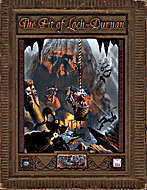
|
About OgreCave and its staff
|

|
by Matthew Pook
Behind David Manuel's decent cover, The Pit of Loch-Durnan is a book with a few problems. The basic layout is all right, but beset by the basic type of typographical errors that can be picked up through the simple use of a spellchecker. Oddly, the sidebars are placed at the bottom of the page. The overall appearance of the book is gloomy, but the most striking problems are to do with the profuse artwork and the maps. The interior illustration can be best described as cartoon-like and amateurish. Nor is it improved by the poor reproduction, as much of it has bitmapped quite horridly. The book's maps, of which there are many, also suffer from this problem. Whilst they can still be read and are thus at least serviceable, they are, to be quite blunt, plain ugly. They also appear to have been created using a piece of mapping software, but no details are given of the one used. So if the appearance of this book is not all that it should be, does this carry over into the writing? Thankfully not, though it does deal with some gruesome issues and perhaps should have carried a warning on the cover rather than the disclaimer on the inside. The plot of The Pit of Loch-Durnan has the party asked to come to the aid of the small village of Loch-Durnan. This isolated community has a secret - it possesses a small, but working gold mine, the Pit of the title. Recently the Pit has become infested with goblins, preventing any mining and the characters are asked to clear them out. [PLOT SPOILER ALERT] Of course, nothing is as simple as this and both village and Pit hide a great deal more. True, the Pit is invaded by goblins, but they are a welcome addition as far as the villagers are concerned. Both they and the goblins have become the corrupted servants of a minor demon, itself imprisoned within a crystal in the Pit. The party only begins to discover this after they are dumped into the mine, not knowing that they are to be fresh converts for the demon. Getting out of the Pit involves getting past the tribe of goblins. Thankfully, allies are at hand, coming from unexpected quarters and with their aid and advice, escape can be achieved. Actually, getting out is only half the task, as there are still the village ringleaders to be found and dealt with. [END OF PLOT SPOILER] Overall, this is a decently plotted adventure with some problems in its presentation. The authors have attempted to bring a gothic-horror feel to their fantasy, but they have not been entirely successful. Primarily this is due to the poor artwork and production values, which does nothing to evoke the kind of atmosphere they want. Instead both art and writing comes across as unnecessarily gruesome. Further, the fact that the adventure is generic enough to slot into almost any game is both a boon and a bane for The Pit of Loch-Durnan. Making it suitable for any setting means that any referee can pick it up and run it in the setting of their choice, whether purchased or designed. Yet this negates the function the adventure should be performing as the first scenario from Mystic Eye's campaign world, The Hunt: Rise of Evil: introducing the setting. The Pit of Loch-Durnan is not a total success as a first release. Yet I am still reluctant to be quite so harsh to the initial book from a new company, so I shall instead describe The Pit of Loch-Durnan as being hampered by a number of teething problems. In its favour, it does represent not unreasonable value for its price ($11.95 for 72-pages). Likewise the plot is involving, and together with the length, this does represent several sessions of game play. The author would like to thank Roj at Wayland's Forge for his assistance
|
||
 The Pit of Loch-Durnan marked the entry of new publisher
The Pit of Loch-Durnan marked the entry of new publisher